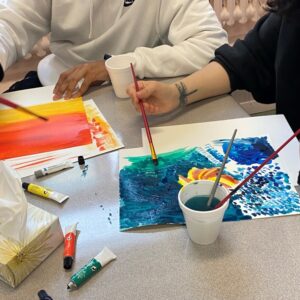Attou Mamat is working in Tiohtià:ke (Montreal, Quebec, Canada) to support young students and their educators in preventing and responding to experiences of violence – and she’s doing so through art.
“I’m an artist myself. I do spoken word. I do music,” Attou explains, “and I strongly believe in the potential for the arts to get our creative gears going and help us imagine a different world – a better world.
“Art is accessible in a way that some other communication methods sometimes aren’t.”
Attou’s work is part of a community initiative she designed and is implementing as part of the Pathy Foundation Fellowship at Coady Institute.
The Fellowship is an intensive 12-month opportunity for graduating students who have a meaningful connection with a community anywhere in the world and an innovative initiative idea to strengthen that community. Fellows are provided with comprehensive training, dedicated ongoing support, and up to $40,000 to make a sustainable impact in their chosen community – and to support their growth as active and effective leaders and change-makers.
Attou Mamat graduated from McGill University’s Faculty of Law in 2022.
“During my legal education, I realized that what we think of as our justice system is actually not set up in a way that is able to enact justice; it’s not able to truly support individuals and communities in healing and growing,” Attou explains.
“And in fact, communities themselves have the tools they need to heal from the various traumatic events that they experience. Prevention really is key in addressing violence and prevention is done best when we center community-based responses.”
Attou hosts weekly workshops at a local high school exploring various forms of art and their connection to broader themes of violence.
My hope is that through exploring these various art forms, students are also getting a better sense of their origins, where this art came from, how it’s related to various topics related to violence such as racial injustice, colonialism, poverty, and really like systemic forms of violence.
I want the students to understand how art really is a form of resistance to these forms of violence.

One of Attou’s community partners is the Montreal Steppers – a performance collective and non-profit organization that uses stepping to influence dialogue around the importance of Black art, Black lives, and Black history in Canada.
Attou explains that this percussive style of dance was developed in African American communities as a form of resistance against anti-Black racism in the United States and is also used as a form of celebration and joy within those communities. She points to its connection with the ‘gumboots’ dance which was developed by South African gold miners as a means of coded communication at the height of the migrant labour system and during the oppressive Apartheid Pass Laws.
In collaboration with guest facilitators, the group has also explored spoken word, zines, and jazz music.
“My hope is that through exploring these various art forms, students are also getting a better sense of their origins, where this art came from, how it’s related to various topics related to violence such as racial injustice, colonialism, poverty, and really like systemic forms of violence.”
“I want the students to understand how art really is a form of resistance to these forms of violence.”